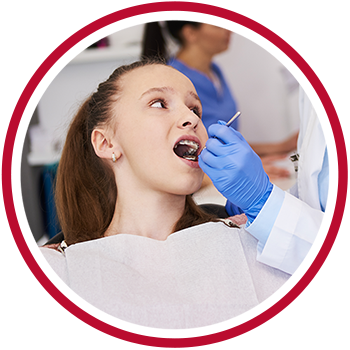When kids and teens first get braces put on, there is an adjustment period. Even once they’re used to their appliance, however, occasional concerns can still pop up. The good news is, true braces emergencies are extremely rare. In fact, most orthodontic concerns can actually be handled at home!
Read on to learn more about how to troubleshoot braces. Or if you have an urgent need, please contact us at (303) 779-5306 and a friendly team member will be more than happy to help!
General Instructions for Brand New Braces
Here are some guidelines to help you navigate the first few days following the placement of your child or teen’s braces and/or appliance:
- Braces will feel a little weird to your kiddo’s lips and tongue. Their mouth will adjust quickly. In the meantime, if they experience irritation, you can have them break off a small piece of orthodontic wax, roll it in between their fingers to warm it up and then flatten it against the part of their braces that’s bothering them. This will protect the soft tissues until they get used to the brackets.
- Patients often feel like they talk funny at first. Any changes in speech are temporary and will improve in time. Reading out loud can help their tongue adjust to the change.
- Most patients are only sore for a few days after getting braces and do not need medication for pain. If soreness is a problem, however, your child or teen can take a non-steroidal anti-inflammatory (such as Advil or Motrin), as long as they do not have any allergies to these types of medicine. Please check with their physician if they have special needs or if there are other medications that need to be taken into consideration.
- The adhesive we use to secure the brackets to the teeth will dry very quickly but can take up to 24 hours to fully set. Your child can eat right after they leave our office. However, we recommend they stick with softer foods for the first few days as you get used to eating with braces.
- There are some foods to avoid with braces, because they can damage the appliance, necessitating a repair appointment and potentially extending the overall treatment time. Kids and teens should not eat hard candy or sticky foods or chew on ice. Be sure to follow the guidelines we provide.
- For the first few days, have your teen check their braces in the mirror after brushing to ensure they’ve removed all food particles. For children, it’s helpful for an adult to check after brushing to make sure their teeth and braces have been cleaned thoroughly. It’s common for patients to have one or two spots they frequently miss, and if these are identified right away, they can develop good, thorough brushing habits from the start.
Common Non-Emergency Concerns and Solutions
Mouth Sores
Rinsing with warm salt water several times a day can help to heal sores that may develop in the mouth. Over-the-counter topical anesthetics, such as Orabase, can also be used to lessen discomfort. Refer to the product label for specific instructions on its use.

Loose or Broken Braces Bracket
Brackets are the small metal pieces that are bonded to the front of each tooth. Eating something really hard or sustaining a blow to the face can lead to a loose or broken braces bracket. The brackets are attached to a wire, so even when they do get damaged, they tend to stay in the mouth. If that’s the case, carefully slide the bracket back in position and cover it with orthodontic wax to prevent irritation and keep it from sliding around. Call Kids Mile High to schedule an appointment to have the bracket repaired.

Loose or Poking Braces Wire
Occasionally, if a wire is too long, it can poke your child in the cheek. Sometimes, it can also come loose when a bracket is broken. To alleviate discomfort, use orthodontic wax to cover the poking wire. You can also try to carefully put the wire back in place using clean, sterilized tweezers. If these two things don’t help, call our office for an appointment to have the wire clipped.

Recognizing a True Orthodontic Emergency

Any of the following are considered an emergency:
- Trauma or injury to the mouth, teeth or face
- Bleeding, swelling or signs of infection in the gums, face or mouth
- An accident resulting in a tooth being knocked out completely or out of position
For signs of an oral infection or a knocked out or displaced tooth, call our office right away. The sooner your child receives emergency dental care, the more likely the tooth can be saved.
For bleeding that doesn’t stop or if you suspect a broken jaw or head injury, go to the emergency room immediately. Once your child receives the appropriate care, then we can repair any damage to their braces.

Forms & Policies
Get acquainted with our policies and get a head start on your child’s paperwork.
BOOK AN APPOINTMENT
Meet our awesome team and start your child on the path to stellar oral health today!


